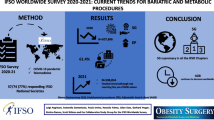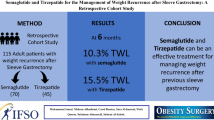Abstract
Background
Gender might be important in predicting outcomes after bariatric surgery. The aim of the study was to investigate the influence of gender on long-term weight loss and comorbidity improvement after laparoscopic sleeve gastrectomy (LSG) and laparoscopic Roux-en-Y gastric bypass (LRYGB).
Methods
A cohort of 304 consecutive patients underwent surgery in 2006–2009: 162 (98 women, 64 men) underwent LSG and 142 (112 women, 30 men) underwent LRYGB. The mean follow-up time was 75.8 ± 8.4 months (range, 60–96 months).
Results
Overall mean (95 % CI) reduction in BMI was 23.5 (24.3–22.7) kg/m2 after 5 years, with no statistical difference between LSG and LRYGB groups (P = 0.94). The overall means ± standard deviations of %EBMIL after 5 years were 78.8 ± 23.5 and 81.6 ± 21.4 in the LSG and LRYGB groups, respectively. Only for LSG group %EBMIL after 24–36 and 60 months differed significantly between male and female patients (P = 0.003 versus P = 0.06 in LRYGB), and 89 versus 90 % of patients showed improvements in comorbidities in the LSG and LRYGB groups, respectively. Only two patients (women) were lost to follow-up: 1/162 (0.6 %) for LSG at the 4th year and 1/142 (0.7 %) for LRYGB to the 5th year.
Conclusions
LSG was more effective in obese male than in female patients in terms of %EBMIL, with no difference in comorbidities. LRYGB elicited similar results in both genders in terms of %EBMIL and comorbidities.


Similar content being viewed by others
References
Livhits M, Mercado C, Yennilov I, et al. Preoperative predictors of weight loss following bariatric surgery: systematic review. Obes Surg. 2011;22(l):70–89.
Biron S, Hould FS, Lebel S, et al. Twenty years of biliopancreatic diversion: what is the goal of the surgery? Obes Surg. 2004;14(2):160–4.
Löfgren P, Hoffstedt J, Rydén M, et al. Major gender differences in the lipolytic capacity of abdominal subcutaneous fat cells in obesity observed before and after long-term weight reduction. J Clin Endocrinol Metab. 2002;87(2):764–71.
Rutledge T, Adler S, Friedman R. A prospective assessment of psychosocial factors among bariatric versus non-bariatric surgery candidates. Obes Surg. 2011;21(10):1570–9.
Baltasar A, Deitcl M, Grecnstcin RJ. Weight loss reporting. Obes Surg. 2008;18(6):761–2.
van de Laar AW. Algorithm for weight loss after gastric bypass surgery considering body mass index, gender, and age from the Bariatric Outcome Longitudinal Database (BOLD). Surg Obes Relat Dis. 2014;10(1):55–61. doi:10.1016/j.soard.2013.05.008.
Andersen JR, Aadland E, Nilsen RM, et al. Predictors of weight loss are different in men and women after sleeve gastrectomy. Obes Surg. 2014;24(4):594–8. doi:10.1007/s11695-013-1124-7.
Adams ST, Salhab M, Hussain ZI, et al. Roux-en-Y gastric bypass for morbid obesity: what are the preoperative predictors of weight loss? Postgrad Med J. 2013;89(1053):411–6. doi:10.1136/postgradmedj-2012-131310.
Morita N, Okita K. Is gender a factor in the reduction of cardiovascular risks with exercise training? Circ J. 2013;77(3):646–51.
Ketterer C, Heni M, Stingl K et al. Polymorphism rs3123554 in CNR2 reveals genderspecific effects on body weight and affects loss of body weight and cerebral insulin action. Obesity (Silver Spring). 2014;22(3):925–31. doi:10.1002/oby.20573.
Tiwari MM, Goede MR, Reynoso JF, et al. Differences in outcomes of laparoscopic gastric bypass. Surg Obes Relat Dis. 2011;7(3):277–82.
Sucandy I, Antanavicius G. Comparative analysis of gender differences in outcomes after biliopancreatic diversion with duodenal switch: revisiting male gender as a predictor for adverse outcomes in bariatric surgery. Am Surg. 2013;79(5):543–4.
Stroh C, Groh C, Weiner R, et al. Are there gender-specific aspects of gastric banding? Data analysis from the quality assurance study of the surgical treatment of obesity in Germany. Obes Surg. 2013;23(11):1783–9.
Scozzari G, Passera R, Benvenga R, et al. Age as a long-term prognostic factor in bariatric surgery. Ann Surg. 2012;256(5):724–8.
Contreras JE, Santander C, Court I, et al. Correlation between age and weight loss after bariatric surgery. Obes Surg. 2013;23(8):1286–9.
Kolotkin RL, Crosby RD, Williams GR. Health-related quality of life varies among obese subgroups. Obes Res. 2002;10(8):748–56.
Ramanathan L, Siegel JM. Gender differences between hypocretin/orexin knockout and wild type mice: age, body weight, body composition, metabolic markers, leptin and insulin resistance. J Neurochem. 2014;131(5):615–24.
Yen YC, Huang CK, Tai CM. Psychiatric aspects of bariatric surgery. Curr Opin Psychiatry. 2014;27(5):374–9.
Yousseif A, Emmanuel J, Karra E, et al. Differential effects of laparoscopic sleeve gastrectomy and laparoscopic gastric bypass on appetite, circulating acyl-ghrelin, peptide YY3-36 and active GLP-1 levels in non-diabetic humans. Obes Surg. 2014;24(2):241–52. doi:10.1007/s11695-013-1066-0.
Bekheit M, Katri K, Ashour MH, et al. Gender influence on long-term weight loss after three bariatric procedures: gastric banding is less effective in males in a retrospective analysis. Surg Endosc. 2014;28(8):2406–11. doi:10.1007/s00464-014-3489-7.
Kennedy-Dalby A, Adam S, Ammori BJ, et al. Weight loss and metabolic outcomes of bariatric surgery in men versus women—a matched comparative observational cohort study. Eur J Intern Med. 2014;25(10):922–5. doi:10.1016/j.ejim.2014.10.020.
Murphy CM, Stojek MK, MacKillop J. Interrelationships among impulsive personality traits, food addiction, and body mass index. Appetite. 2014;73:45–50.
Wandel M, Roos G. Work, food and physical activity. A qualitative study of coping strategies among men in three occupations. Appetite. 2005;44(1):93–102.
Heitzmann CA, Kaplan RM, Wilson DK, et al. Sex differences in weight loss among adults with type II diabetes mellitus. J Behav Med. 1987;10(2):197–211.
Wadden TA, Ncibcrg RH, Wing RR, et al. Four-year weight losses in the Look AHEAD study: factors associated with long-term success. Obesity (Silver Spring). 2011;19(10):1987–98.
Chiolero A, Faeh D, Paccaud F, et al. Consequences of smoking for body weight, body fat distribution, and insulin resistance. Am J Clin Nutr. 2008;87(4):801–9.
van Hout GC, Verschurc SK, van Heck GL. Psychosocial predictors of success following bariatric surgery. Obes Surg. 2005;15(4):552–60.
Levine JA. Non exercise activity thermogenesis (NEAT): environment and biology. Am J Physiol Endocrinol Metab. 2004;286(5):E675–85.
Buchwald H, Avidor Y, Braunwald E, et al. Bariatric surgery: a systematic review and meta-analysis. JAMA. 2004;292:1724–37.
Conflict of Interest
The authors declare that they have no competing interests.
Ethical Approval
All procedures performed in studies involving human participants were in accordance with the ethical standards of the institutional and/or national research committee and with the 1964 Helsinki declaration and its later amendments or comparable ethical standards.
Informed Consent
informed consent was obtained from all individual participants included in the study.
Author information
Authors and Affiliations
Corresponding author
Rights and permissions
About this article
Cite this article
Perrone, F., Bianciardi, E., Benavoli, D. et al. Gender Influence on Long-Term Weight Loss and Comorbidities After Laparoscopic Sleeve Gastrectomy and Roux-en-Y Gastric Bypass: a Prospective Study With a 5-Year Follow-up. OBES SURG 26, 276–281 (2016). https://doi.org/10.1007/s11695-015-1746-z
Published:
Issue Date:
DOI: https://doi.org/10.1007/s11695-015-1746-z




